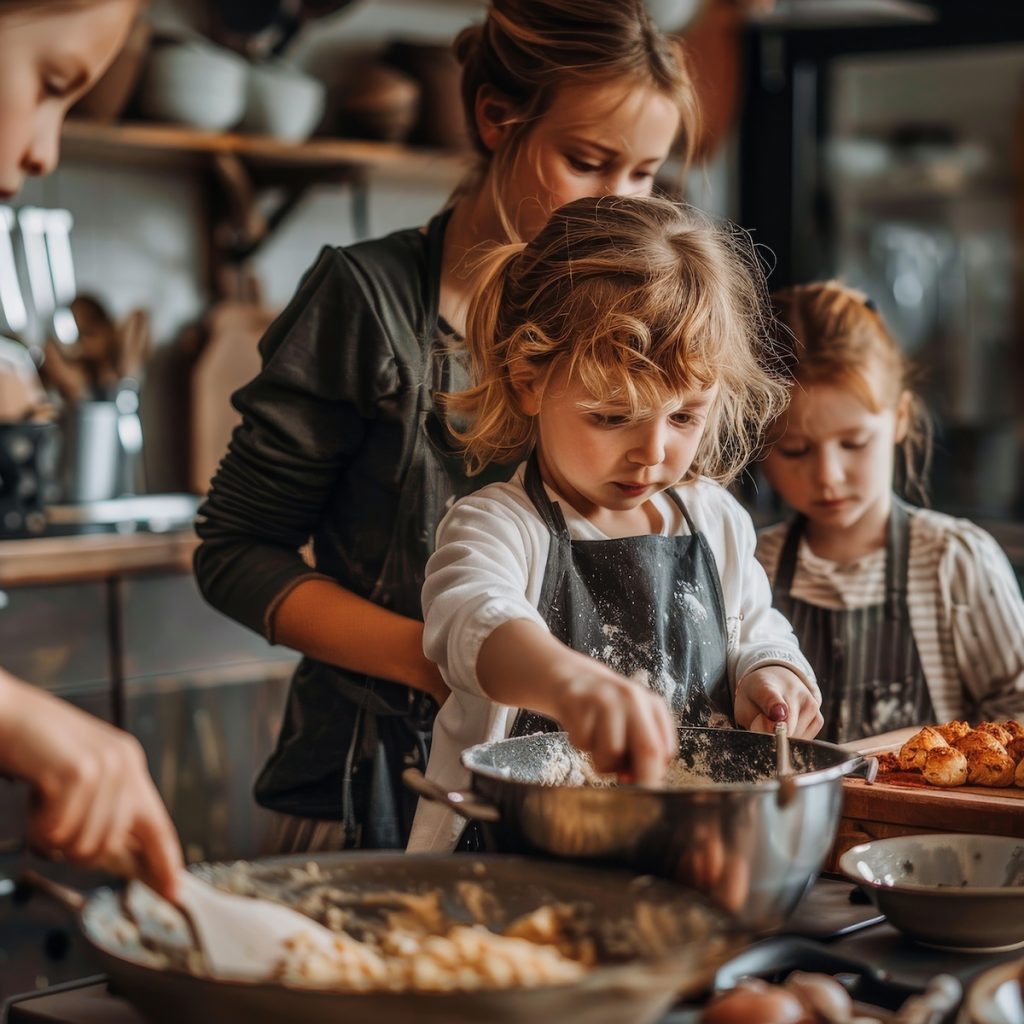How Cooking Can Give Your Children Self Confidence
Cooking is more than just a life skill; it’s a powerful tool for building self-confidence in children. When kids enter the kitchen, they enter a space where creativity meets responsibility, and every successful dish becomes a personal achievement.
As they learn to measure, mix, and experiment with flavors, children gain a sense of accomplishment that boosts their self-esteem. Following a recipe, making decisions, and overcoming challenges—like a lumpy batter or a burnt toast—teaches resilience and problem-solving. Moreover, cooking allows kids to express themselves through food, giving them a tangible way to share their creations with family and friends.
This sense of pride in their work fosters a positive self-image and encourages them to take on new challenges confidently. Beyond the skills they acquire, cooking empowers children by showing them they can contribute meaningfully to the household. Whether making a simple sandwich or helping prepare a family meal, every task they complete in the kitchen helps them grow into more confident, capable individuals.
AND Learn How To Follow Directions
Cooking is an excellent way for children to practice and improve their ability to follow directions. Recipes are instructions that must be followed to achieve the desired result. As kids navigate a recipe, they learn to pay close attention to details and follow steps accurately, from measuring ingredients to setting the right temperature.
This process teaches them the importance of sequencing, as each step in a recipe often depends on the previous one. For example, if they remember to preheat the oven or mix the batter properly, the final dish may turn out differently than expected. Through cooking, children learn that following directions carefully leads to success, reinforcing the value of being thorough and attentive.
Additionally, cooking often involves multi-step instructions that require focus and patience. As kids follow these steps, they practice breaking down tasks into manageable parts and completing them logically. This skill is transferable to other areas of life, such as schoolwork, where following directions is essential for understanding assignments and solving problems.
By seeing the positive results of following directions in cooking, children gain confidence in their ability to follow instructions in other contexts, enhancing their overall ability to follow directions effectively.
Language Skills
Cooking can significantly enhance a child’s language skills in several ways. When kids are involved in the kitchen, they are exposed to a rich vocabulary beyond everyday conversations. Reading recipes introduces them to new words, phrases, and instructions, helping them expand their vocabulary. They learn specific culinary terms like “whisk,” “simmer,” or “knead,” which boosts their language comprehension and usage.
Following a recipe also requires understanding sequential language, which is crucial for reading comprehension and clear communication. Children learn to interpret and follow step-by-step instructions, which helps them grasp the importance of order and logic in language. Additionally, discussing ingredients, cooking methods, and the final dish encourages dialogue, allowing kids to practice expressing their thoughts, asking questions, and engaging in conversations.
Moreover, cooking can be a platform for storytelling. As they cook, kids might share stories related to the dish, its origins, or their experiences, which nurtures their narrative skills. This combination of reading, listening, and speaking in the kitchen environment creates a dynamic and engaging way for children to develop and refine their language abilities.
Following Directions
When it comes down to it, cooking is about following directions. We all start cooking with the directions right in front of us.
If we practice enough, we can cook with the directions stored in our heads. Cooking with kids is a beautiful way to reinforce following directions. You can show real-life examples of what happens when you do and do not follow directions. Use high heat instead of low heat, and you burn your onions.
I’m not suggesting that you ruin your food, but I think it is important to talk to your kids about why you do things in a certain way and what could happen if you don’t.
Cooking with two or more children can be stressful, but this scenario also allows you to teach cooperation. You can assign separate steps to different children (Jimmy, you crack the eggs, and Mary, you stir them in), or you can have the children share steps (Jimmy, you crack one egg and stir it in; Mary, you crack the next one and stir it in).
Either way, you must encourage them to work together and frequently reinforce the enjoyment of cooking. You can also point out how proud you are of the children working together. This is a great time to use words like “sharing,” “cooperation,” and “taking turns.”
Again, teaching these concepts in a natural, contextually rich setting will help to reinforce the concepts with your kids.
Self Confidence
Cooking significantly boosts a child’s self-confidence by providing them opportunities to achieve and succeed in a hands-on, creative environment. When kids cook, they take on tasks that may initially seem challenging, such as measuring ingredients, following a recipe, or mastering a new cooking technique. As they complete these tasks, they experience a sense of accomplishment, reinforcing their belief in their abilities.
Whether simple or complex, each dish they create is tangible proof of their skills and effort. This visible outcome—like a perfectly baked cake or a well-cooked meal—gives them something to be proud of, naturally enhancing their self-esteem. Sharing their culinary creations with family or friends also provides positive reinforcement, as praise and appreciation from others further bolster their confidence.
Moreover, cooking encourages kids to experiment and take risks in a controlled environment. They might try new ingredients, alter a recipe, or invent their dishes, which teaches them that it’s okay to make mistakes and learn from them. Overcoming kitchen challenges, such as fixing a dish that didn’t turn out as expected, fosters resilience and perseverance, which are critical to self-confidence.
Other Benefits
Through cooking, children learn they are capable, creative, and resourceful—qualities that help them feel more confident in other areas.
In addition to boosting self-confidence, cooking helps children develop a wide range of valuable skills:
- Math Skills: Cooking naturally incorporates math through measuring ingredients, adjusting recipe portions, and timing cooking processes. Kids practice counting, fractions, and basic arithmetic, which helps reinforce these concepts in a practical setting.
- Motor Skills: Cooking activities, such as stirring, chopping, kneading, and pouring, help children develop fine motor skills and hand-eye coordination. These tasks require precision and control, essential for overall physical development.
- Creativity: Cooking allows kids to express creativity by experimenting with flavors, textures, and presentation. They can try new combinations of ingredients, invent recipes, or decorate dishes, encouraging imaginative thinking and innovation.
- Science Understanding: Cooking is a hands-on way to explore fundamental scientific concepts. Kids learn about chemical reactions (like baking soda causing dough to rise), changes in states of matter (melting, boiling), and the impact of heat on food. This practical experience helps them grasp science concepts fun and engagingly.
- Cultural Awareness: Cooking introduces children to different cuisines and cultures, fostering an appreciation for diversity. Through food, they can learn about various cultures’ traditions, ingredients, and cooking methods, broadening their worldview.
- Responsibility and Independence: Cooking teaches kids to take responsibility for their tasks, from preparing ingredients to cleaning up after themselves. As they become more skilled, they can take on more complex cooking duties, fostering independence and a sense of ownership over their contributions to the household.
- Healthy Eating Habits: Involving children in cooking can lead to better eating habits. When kids participate in meal preparation, they’re more likely to try new foods and make healthier choices. Cooking at home also provides an opportunity to educate them about nutrition and the benefits of a balanced diet.
- Social Skills: Cooking can be collaborative, encouraging teamwork and communication. Whether cooking with family members, friends, or in a cooking class, children learn to work together, share responsibilities, and enjoy the social aspect of preparing and sharing meals.
Cooking is a multifaceted activity that nurtures a child’s development in numerous areas, equipping them with essential life skills that extend far beyond the kitchen.





4 Responses
hi, i totally agree with you. And its fun teaching kids especially when you see them so eager to learn. Honestly speaking children are easy to teach than grown ups. hahahaha! I can say this because i have taught my niece whom i raised to cook and bake. I started teaching her when she was 4yrs old. She is now 13yrs old and she can bake her own cookies and cakes.
The funny thing there is, once some college students of mine when to my house and taught them how to bake. My niece said, “mama, how come they work that way? they are not organized and they are so messy…… look mama they don’t know how to bake. How come i can?” she even said that in a loud voice. Nica was only 7 or 8yrs old back then when that happened. My college students were so embarassed. And funny thing there was my niece was the one who taught them some other recipes.
Now one of my chefs uniform is now her uniform when she bakes at home. Parents, godparents, aunties or uncle, brothers or sister… encourage small kids to bake with you. Allow them to enjoy these things. In the long run you are teaching them to be more creative and to be more diciplined.
Hi Sophie,
Great post. Thank you for adding your story. Are you still working as a chef?
Great Post! It’s a lot of great info!
Sounds like a great idea for cooking with kids! Thanks for sharing!